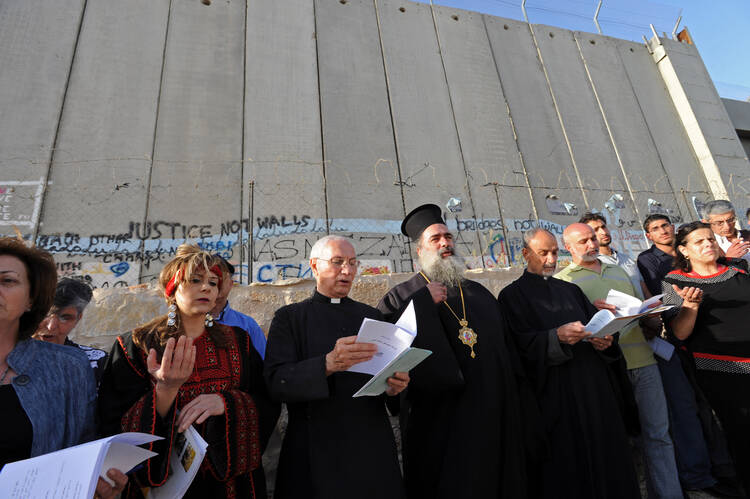On April 2, the Assembly of the Catholic Ordinaries of the Holy Land issued a historic communiqué asking, “Are Christians being persecuted in the Mideast?” The bishops answer ‘Yes, but,’ because the question ignores the persecution of Muslims as well as Christians (See below).
The Assembly re-focuses the questions so often posed by their defenders and religious liberty advocates in the United States about the persecution of Christians in the Middle East. While “Christians are targeted,” the bishops write, “they fall victim alongside many others who are suffering and dying in these times of death and destruction.” The bishops remind their readers that “Secular Muslims, all those defined as ‘heretic,’ ‘schismatic’ or simply ‘non-conformist’ are being attacked and murdered in the prevailing chaos” as well.
In response to the killing, the Assembly argues, “Christians and Muslims need to stand together against the new forces of extremism.” Their enemies would “create a society devoid of Christians and where only very few Muslims will be at home.” Discounting “outside” (international) assistance, they contend, “We [Middle Eastern Christians and Muslims], alone, can build a common future together.”
Affirmation of the common fate of Christians and Muslims is a longstanding position of the Assembly and of the Catholic patriarchs of the Middle East. What is strikingly new in the communiqué is its criticism of other churches in the region for their silence in the face of repressive regimes. In the tumultuous political climate of the region, the Assembly admits, it is natural to look to authority to guarantee “law and order.” But the dictatorial regimes of the region, they warn, provide security “at the terrible price of military and police repression.”
An added price for the church’s survival has been willing avoidance of the church’s teaching on human rights and the social pastoral agenda rooted in it. The Assembly gently admonishes other Christian communities that loyalty to the faith and the common good “should perhaps have led [Christian leaders] to speak out much earlier, telling the truth and calling for necessary reforms.” They should have voiced their criticisms, the Assembly says, “alongside many courageous Christians and Muslims who did speak out.”
In chiding the silence of other Christians, the Assembly breaks with the historic pattern in which church leaders carefully avoid criticism of the choices other Christian churches are forced to make under authoritarian regimes. Instead, it attempts to set a new precedent for how the Arab churches of the Middle East should face future conflicts: Stout defense of human rights for all.
The situation of the church in the Holy Land (Israel, Palestine and Jordan) is unique, because, despite many difficulties of its own, it has enjoyed relative freedom. For that reason it has been able to be a critic of injustice, an advocate for the oppressed and a proponent of nonviolent resistance. How its moral message will be received by other local churches living in more conflicted and more oppressed countries of the region, where it will require more courage to promote the human rights of all, is still to be seen.
All the same, the Assembly offers an alternative strategy to wary silence for the church’s survival under dictatorial regimes. “We have to adapt ourselves to our realities, even the realities of death,” the bishops write, “and must learn together how to emerge from persecution and destruction into a new dignified life in our own countries.”
Implicitly, the common future they hope for is the same for which the young activists of the Arab Spring yearned, a “new age of dignity, democracy, freedom and social justice.”
“Together, we must seek out all those who dream as we do,” the Assembly urges, “in which Muslims, Christians and Jews are equal citizens, living side by side, building together a society in which new generations can live and prosper.”
What a grace it would be if Christian minorities could survive in the Middle East while they kept true to the ideals of Catholic Social Teaching and witnessed to the rights of all their fellow citizens. The Assembly’s communiqué helps open space where grace may do its work to that end, though not without cost.
But the churches have already paid a great price for silent acquiescence to authoritarian regimes, have they not? And not the least of that price came in what was exacted from “the truth and the integrity” with which we “as Christians and as a Church” should speak.
See the text of the communique here.
Drew Christiansen, S.J. is former editor in chief of America. A canon of the Holy Sepulchre (Jerusalem), he has written extensively on Arab Christians and Mideast affairs.








